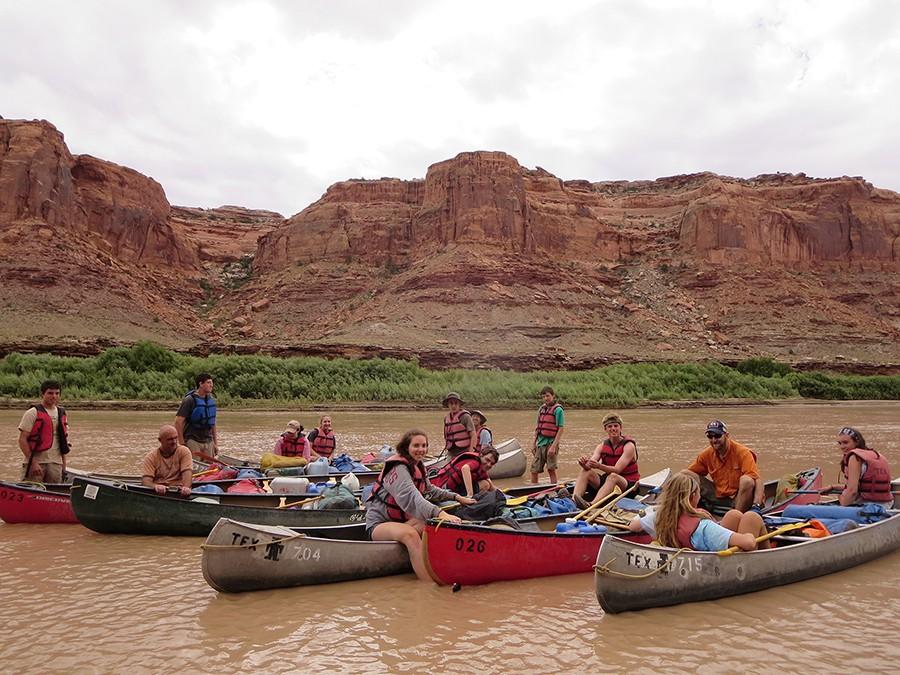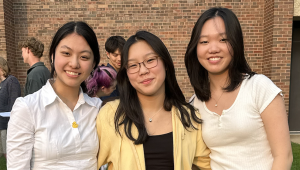Wilderness Retreat offers unique learning opportunity
Students learn more than just survival skills on the annual Wilderness Retreat
February 26, 2016
Imagine being in the desert, canoeing in a river in Utah, after a hearty meal.
If this appeals to anyone in any way, then consider going on the annual Wilderness Retreat.
The Wilderness Retreat runs from July 6-18. The trip is a canoeing and hiking based adventure in Utah’s Canyonlands National Park.
The retreat does require prior completion of Biology or Environmental Geoscience and includes a studying component. According to leaders and social studies teacher Elizabeth Plank, the amount of time spent studying on the trip is done in a “practical” manner. Ecology, Human History, Environmental Ethics, and Team Building are the focus of the trip.
The educational aspects were enough to make the course count for .25 credits, but it is by no means a typical class. “We read some short articles on the bus ride, we bring a small set of books, and we read excerpts,” Plank said.
“It’s not heavy curricular studies. We’ll say ‘hey read this chapter of this book and then we’ll have a short discussion after dinner,” said Plank.
If any potential trip taker was worried about experience, the trip’s participants have a “variety of experience levels,” according to Plank. “You don’t have to have any camping experience to go on this trip,” Plank added.
This trip creates long lasting friendships. Participants don’t fly down to Utah, but instead take a bus or van from New Trier. It is on this road trip that the trippers “really get to know each other,” Plank said.
On the actual wilderness adventure, campers bond even more. They live in tents together to the point where “three days into the trip, all the kids are like cramming into one tent playing card games.” The trip is a bonding experience no doubt.
Unfortunately, the trip does not include campfires. It is a “desert rule” that there are no fires, but the traditional campfire activity of storytelling is still a big part of the trip.
If one has already been on this trip, it is not too late to go again either. “We do have thoughts of adding another location so that a kid can go on this trip multiple times while at New Trier,” said Plank. “We have a kid who wants to go on the same trip he did sophomore year as a senior,” added Plank.
A typical day on this trip starts off early. “We are canoeing in the desert. As much as Mr. Goodspeed and I would like to sleep late, you do have to get up early to beat the heat. You get up with the sun,” said Plank.
After cooking a hot breakfast, the group canoes “leisurely” down the river according to Plank. Plank added that the river has a current to it, so there is little need to paddle. “It’s a peaceful river.”
The group canoes for a few hours before stopping for a snack break, then they continue canoeing until a site is found. At the site, the group can hike through rugged sites of nature, and Native American ruins. They eat lunch at the site, and even go swimming. “That’s a typical morning,” said Plank.
Then they canoe for another few hours before the camp site is found, they set up the camp, and they make “a huge group dinner,” according to Plank. “We do eat nicely on this trip with fresh vegetables, and meat, and all that good stuff.” Then they take a night hike before coming back to the camp to do the previously mentioned activities.
“That’s a typical day. There is plenty of jumping in the river to stay cool because it’s hot,” said Plank. A desert in the summer is bound to be hot, but Plank also said that because the trip stays on the river the whole time, the heat is never at a dangerous level.
Plank also stressed the relative cost of the trip. “This trip is very affordable compared to any commercial trips of a similar sort,” said Plank. “The cost of the trip includes everything except someone’s clothing necessary for this trip.”
If anyone wants more information about the trip, contact Ms. Elizabeth Plank at [email protected] . She can also be found in room 300 (the Social Studies Department.)












































